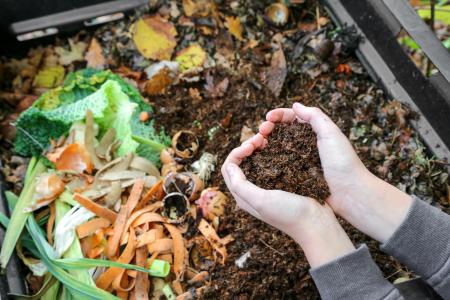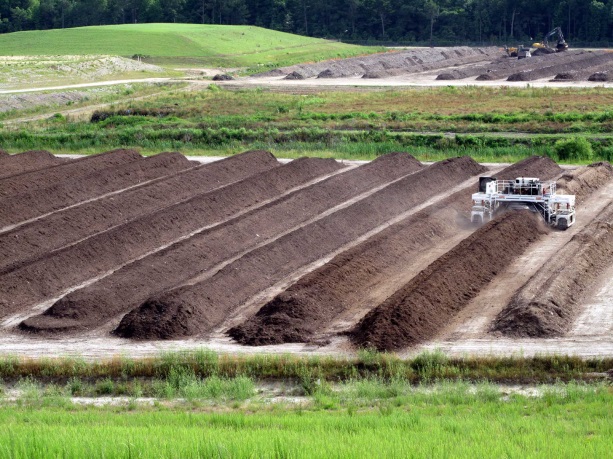Walking through the dining halls on campus, I’m sure you’ve noticed the bins near the trash area talking about composting. However, a lot of people are unclear on what exactly this is and why they should bother to do it. Several years ago composting was thought of as something done only by the earthiest of individuals. After all, who really wants to collect their garbage and intentionally let it rot on their back porch just to keep it off the weekly trash truck? Recently however, there has been an increase in the number of people composting at their homes, and perhaps more significantly, an increase in the popularity of municipal composting operations. These operations claim that composting is far more eco friendly than simply sending food to the landfill. The question remains though: What impact-if any- does composting really make on the environment? Is it as beneficial as people claim it to be?

To answer this question, it is important to first understand what composting is. Put simply, composting is the process by which organic waste (chemically organic not just “organic” from the grocery store) is broken down by microbes and fungi into a soil like substance, instead of disposing of this material in a landfill. The resulting substance is called compost and makes an excellent addition to gardens and farms because it improves soil structure, water holding capacity, and nutrient content.
Currently there are two main pathways by which food waste is composted: At home and in municipal facilities. Home composting operations typically consist of just a small pile or bin in which food scraps are place and mixed occasionally (to add oxygen necessary for rapid decomposition). These systems can work well, although the smaller size of the pile leads to somewhat slower decomposition, and because the piles are usually smaller they also do not typically generate enough heat from microbial activity to pasteurize the compost and kill off harmful plant/human diseases or weed seeds. These piles may still be effective, but the user must simply be a little more cautious on what they put in.

A municipal composting operation involves the collection of food waste from a variety of sources such as homes, restaurants, and often yard waste like bagged leaves and tree trimmings from power line companies. These materials are all brought to large areas where they are shredded and combined using special equipment to create massive rows of material that can be aerated with a tractor/skid steer. Because of the large thermal mass in the piles, they can easily reach internal temperatures of over 160 F for several days which is enough to kill off most pathogens. This means that even contaminated material can be used in these operations with minimal risk of a contaminated final product. These municipal operations usually give away or sell the finished compost to local residents to use in their own gardens/flower beds.
With all that being said, does composting really have any potential to make a substantial impact against climate change? The numbers seem to say it does.
Quick Stats:
-
- Composted food waste produces 50% less CO2 equivalent greenhouse gasses than landfills (Source)
- This has to do with the aerobic decomposition of compost which greatly reduces the production of very potent greenhouse gasses like methane (CH4)
- In 2015, only about 38% of US food waste was composted (Source)
- Studies estimate that a 20% increase in composted food waste (increase from 38 to 58% of food waste being composted) in the US could reduce CO2 equivalent emissions by about 1.4 gigatons from 2020-2050
- Composted food waste produces 50% less CO2 equivalent greenhouse gasses than landfills (Source)
This is a substantial reduction in greenhouse gas emissions, and it doesn’t even account for the benefits of using all the compost produced to enrich soils (which would encourage faster CO2 sequestration by plants)
However, you may be wondering if this is finically feasible. That is a very good question, but the estimates show that a $1.4 billion investment in the municipal composting system in the US would be enough to achieve this 20% increase in compost production, and the money saved over the same time period would be over $30 billion compared to not investing in these systems.
Overall, it seems composting has the potential to make significant contributions to societies fight against climate change. So the next time you’re at the dining hall, consider taking the 10 extra seconds to sort your plate between the compost and trash bins.
Okay, I laughed when you said, “the earthiest of individuals.” I know you mentioned Penn State dining halls, do you know if Penn State composts with the waste they produce in their dining halls? If so, I’m sure they can produce a lot of compost because of the size of such a large campus.
Yes, Penn State does have a composting program for the food and organic material produced on campus as part of their sustainability initiatives. It is run by the Office of Physical Plant (OPP), who then sells the compost behind lion surplus for ~$18/cubic yard, providing funding for the university as well as a cost effective soil amendment for residents.